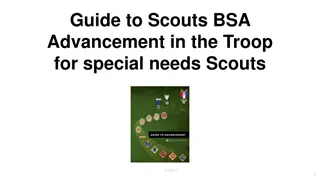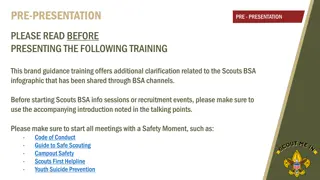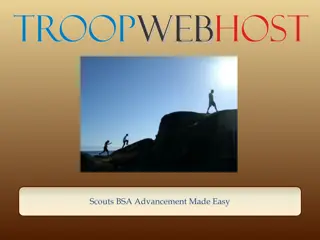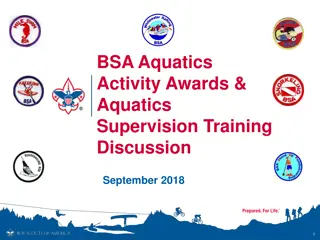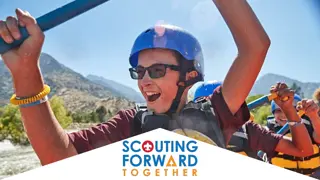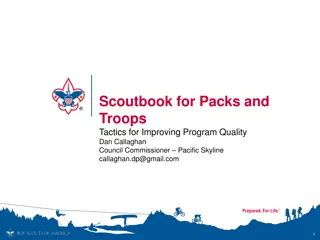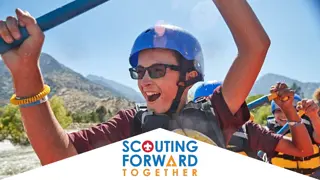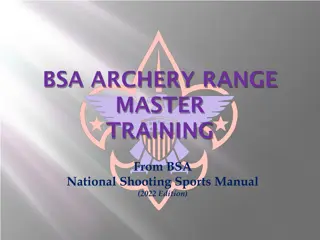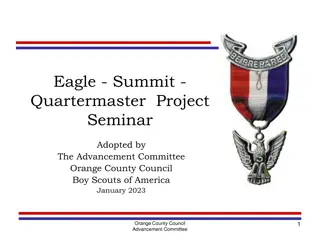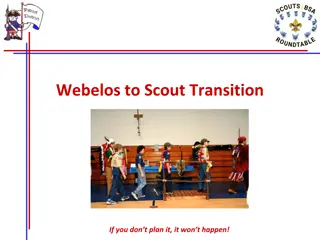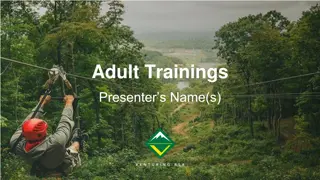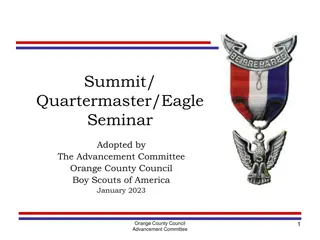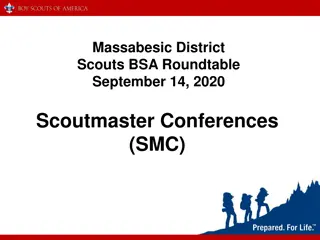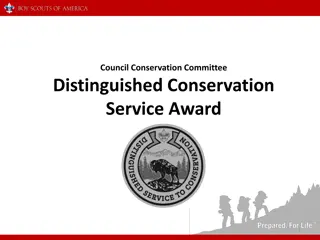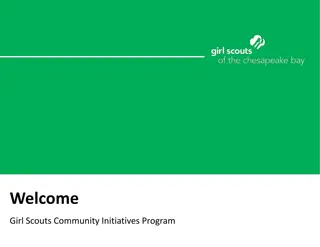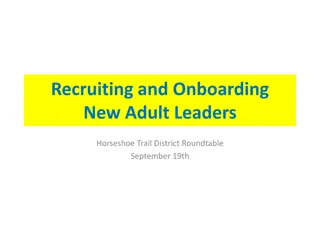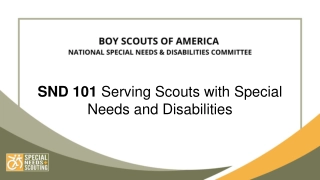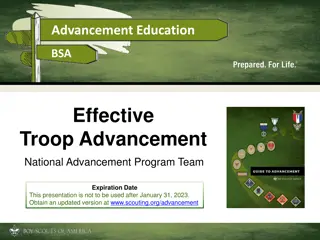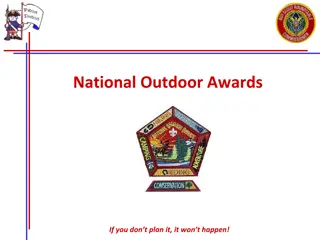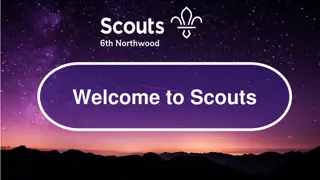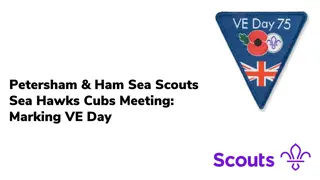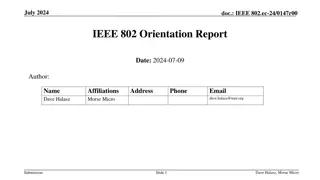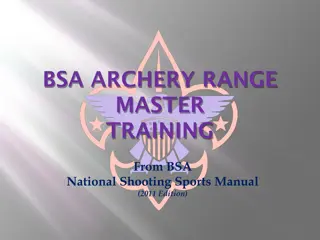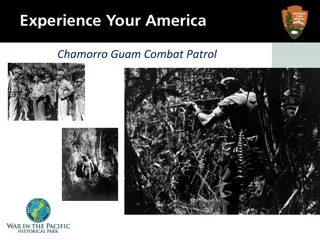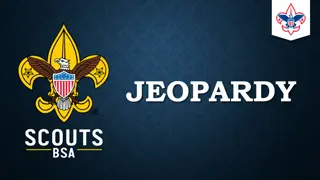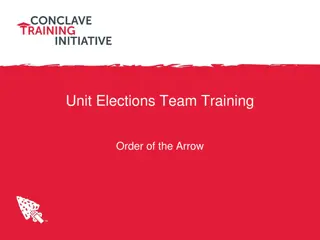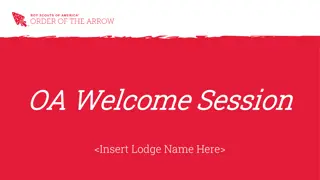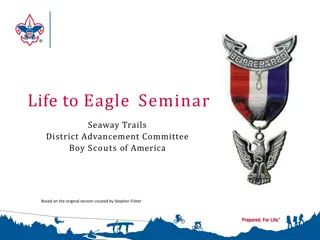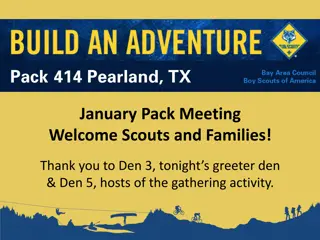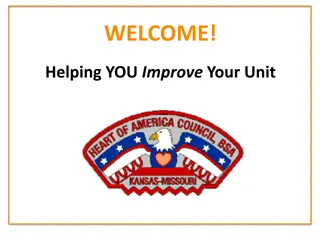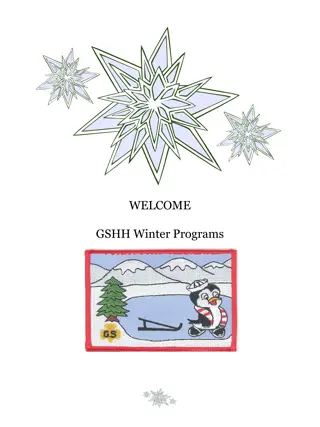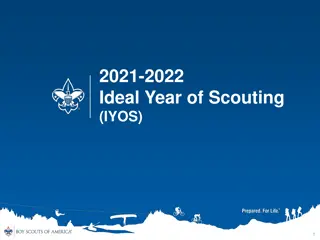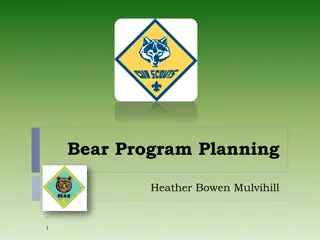Scouts BSA New Parent Orientation Troops 1041 & 6041 - Overview and History
Explore the Scouts BSA New Parent Orientation for Troops 1041 and 6041 in the Voyageur District, Bay Lakes Council. Dive into the goals and history of Scouting, organizational overview, leadership, advancements, and more. Discover the rich heritage of Troops 1041 and 6041, dating back to their charters in 1958 and 2019 respectively, with the aim of character development, citizenship training, and personal growth through fun and engaging activities.
Download Presentation

Please find below an Image/Link to download the presentation.
The content on the website is provided AS IS for your information and personal use only. It may not be sold, licensed, or shared on other websites without obtaining consent from the author. Download presentation by click this link. If you encounter any issues during the download, it is possible that the publisher has removed the file from their server.
E N D
Presentation Transcript
Scouts BSA New Parent Orientation Troops 1041 & 6041 Voyageur District Bay Lakes Council
Agenda The Goals of Scouting History History of Scouting History of Troop 1041 & 6041 Organization BSA Organizational Overview Cub Scout/Scouts BSA Differences Troop Organization Leadership Scout s Leadership within Troop Scout Leadership and Training Advancement Scouts BSA Advancements First Class Emphasis Program Uniforms Recommended Equipment Troop Camping, Activities and Service Troop Communications Other Important Stuff Adults and Parents Stuff
The Goals of Scouting The Aims of Scouting Character development Citizenship training Physical, mental, and emotional fitness Aims are Delivered by these Methods Ideals Patrols Outdoor Programs Advancement Personal Growth Leadership Development Uniform Associations With Adults The principal focus is on the Scouts and in making it fun
History of Scouting The Beginnings of Scouting Movement The 20th-century scouting movement was started by Robert Baden-Powell during the Boer War as a series of games and exercises to help men learn to live in the open under difficult conditions Baden-Powell developed a book called Aids to Scouting as a way of training recruits. This book became an instant hit among boys He conducted his first Boy Scout camp on Brownsea Island in 1907, and his book Scouting for Boys was published in 1908 In England, Boy Scouts formally started on Jan. 24, 1908 History of Scouting in the USA In the United States the Young Men's Christian Association (YMCA) had been running camps for boys since 1884. In 1902 Ernest Thompson Seton founded the Tribe of Woodcraft Indians as a boy's organization. Three years later Daniel Carter Beard started a similar society called the Sons of Daniel Boone. February 8th, 1910 William Boyce, inspired by unknown Scout in London, incorporated BSA working with YMCA and Seton In 1910, Seton combined B-P Scouting for Boys and Woodcraft Manual to publish first BSA Handbook
History of Troop 1041 & 6041 1041 first chartered in 1958 6041 first chartered in 2019 Our chartering organization is the Red Smith School PTO Eagle Scouts: Troops 1041 & 6041 have seen 58 Scouts complete their Eagle Rank
BSA Organizational Overview The Scout Organization BSA National Council Region Local Council Bay Lakes Council District Voyageur Chartered Organization Red Smith School PTO Troop Committee Committee Chair: Eric Beyer Troop Scoutmasters: John Trabert 1041 Holly Schlag 6041 Asst. Scoutmasters Jason Lemoine 1041 Mike Brownell 1041 Barb Debroux 1041 Crystal Miller 6041 Jeff LaFond 6041
Cub Scout/Scouts BSA Differences A Scout Troop is not structured like a Cub Pack Youth have more responsibility Planning, packing, setting up camp, cooking, activities Scout is responsible for initiation of advancement Adult Troop Leaders and Youth Troop Leaders support the Scout in their advancement efforts. We give Scouts the chance to try and learn things, and make mistakes in a safe environment
Patrol Method A Troop is made up of Patrols, A Troop is not divided into Patrols Each Patrol operates as a self-sufficient unit. Each Patrol is encouraged to develop their own identity with a Patrol flag and yell. Each Patrol will utilize a duty roster to distribute tasks across the team members and learn the value of teamwork Each Patrol will have its own Patrol Leader (PL) Patrol leaders will attend monthly planning meetings (PLC) and represent their patrol & are responsible for patrol communications. Adults do NOT run the patrols. Depending on attendance, patrols may be combined for activities. Patrol leaders will make mistakes. This is a learning activity. Each scout will get their opportunity to lead and to learn how to lead effectively.
Scouts Leadership within Troop 1041 & 6041 Patrols (A Troop is made up of Scouts in Patrols) Grouping of youth who work together. Each patrol elects its own youth leader, called a patrol leader. Troop Youth Leaders The troop is actually run by its youth leaders. With the guidance of the Scoutmasters and their assistants, they plan the program, conduct troop meetings, and provide leadership among their peers. Senior patrol leader - top junior leader in the troop. They lead the patrol leaders' council and, in consultation with the Scoutmaster, appoints other junior leaders and assigns specific responsibilities as needed. Assistant senior patrol leader - fills in for senior patrol leader in their absence. They are also responsible for training and giving direction to the quartermaster, scribe, troop historian, librarian, and instructors. Troop Historian - collects and maintains troop memorabilia and information on former troop members. Works with Webmaster to post on Troop website.
Scouts Leadership within Troop 1041 & 6041 Troop Youth Leaders (continued) Librarian - keeps troop books, pamphlets, magazines, audiovisuals, and merit badge counselor list available for use by troop members. Chaplain Aide - assists in troop religious services and promotes religious emblems program. Patrol leader - gives leadership to members of their patrol and represents them on the Green Bar (a/k/a patrol leaders council). Troop guide - advisor and guide to new Scout patrols. Den chief - works with a Cub Scout den as a guide. Quartermaster - responsible for troop supplies and equipment.
Scouts Leadership within Troop 1041 & 6041 Troop Youth Leaders (continued) LNT Trainer - helps minimize impact on the land by teaching members the principles of Leave No Trace and improving Scouts' outdoor ethics decision-making skills Webmaster - The troop webmaster is responsible for maintaining the troop's website. Bugler - Makes appropriate bugle calls, as requested, at troop activities.
Scout Leadership and Training Leadership Scouts elect their own major leadership Senior Patrol leader (entire troop) Patrol leader (each Patrol) Other positions appointed by Scout and adult leaders Terms are flexible Scout Leadership Training Youth Leader Training is provided by the Scoutmaster following each Troop Election NYLT (National Youth Leader Training) Troop currently pays cost of Scout training pre- approved by Scoutmaster
Scout BSA Advancements Process by which Scout progresses Advancement is a means to an end, not an end in itself Designed to help Scout have exciting and meaningful experience Education and fun are key to advancement principles Scout through First Class Ranks focus on Scouting s basic skills Goal of BSA and Troop 1041 & 6041: every Scout achieves First Class within the Scouts first year Rank Advancements Scout Tenderfoot Second Class First Class Star Life Eagle
Advancement Principles Personal growth is the prime consideration in the program Learning by doing Each youth progresses at own rate A badge is recognition of what a young person is able to do, not just a reward for what has been done Advancement encourages Scouting Ideals The parent s role is to monitor, motivate, and support the scout
Scout BSA Rank Advancement Scoutmasters oversee Scout advancement Advancement Coordinator maintains records and arranges Boards of Review and Courts of Honor There are four steps in the Scout BSA Advancement Process: Learning Testing Reviewing Recognition
Advancement - Merit Badges There are currently 138 Merit Badges Teach Scouts about sports, crafts, science, trades, business, and future careers Required for rank advancement beyond First Class Scout 21 Merit Badges required for Eagle Scout (14 specific badges required) All earned merit badges must have a completed blue card Always take a blue card when attending a merit badge event obtain from Mr. Verhagen and signed by Mr. Trabert or Mrs. Schlag Merit Badge Counselors (MBC) Our troop has many MBC s. List is found on troop website
Scoutmaster Conferences Essential to individual Scout development and advancement Getting to know scout Setting individual goals Mentoring Building confidence Encouragement Problem Solving and discipline Scouts responsible for scheduling an advancement Scoutmaster Conference after requirements for rank advancement completed
Board of Review Evaluation of the effectiveness of the Scouting program within the troop Review is not an examination Make sure Scout has completed the requirements Determine how good an experience Scout is having within the Troop Encourage Scout to advance further Scout is responsible for scheduling a BOR after completing the Scoutmaster Conference
Recognition Each time a Scout advances in rank, they will be recognized Rank advancement is effective after approval by Board of Review Formal recognition occurs at the Court of Honor Court of Honor Order of the Arrow Eagle Scout rank is usually recognized by a very special Eagle Court of Honor
First Class Emphasis Program Troop 1041 & 6041 focuses on new Scout development and advancement to First Class within the first year From the Scoutmaster Handbook: A youth who advances to First Class within his first year in Scouting has a better-than-average chance of eventually becoming an Eagle Scout. BSA statistics confirm the Scout is likely to stay in Scouting for a longer period of time.
Uniforms Field Uniform (Class A) Tan Scout BSA shirt, Scout pants or shorts, Scout belt Bolo Required for travel, Courts of Honor, Troop meetings, meals on some campouts, and other more formal events Activity Uniform (Class B) Troop or other Scout t-shirt or sweatshirt Khaki/olive green shorts or jeans can be substituted for Scout pants/shorts As deemed/determined appropriate for the activity Troop 1041 & 6041 T-shirt orders will be taken soon
Recommended Equipment Uniform (Required) Handbook (Required) Sleeping Bag Appropriate for Wisconsin weather Sleeping Pad Tent Provided by Troop Mess Kit Water Bottle Flashlight Compass Camp Chair
Troop Camping Camps and campouts Troop 1041 & 6041 camps an average of once each month Patrols usually plan, purchase, and cook their own meals A one week Summer camp Regular campout procedures Troop Annual planning & scheduling meetings Monthly planning at PLC and Troop Meetings 2 weeks before campout, turn in permission slip via website, pay camp fee (ISA or check) Transportation costs are included. Drivers turn in reimbursement form to Treasurer Boating Area
Troop Activities Maple Syrup at Bear Paw Skiing / Snowboarding Lock-ins Merit Badge Saturday STEMpede Winter Weekend High Adventure Boating Area And so much more!
Service Projects Our scouts are encouraged to participate in service projects. The purpose of this activity is to build a sense of community. One influences community by being involved The Troop will participate in various service projects: Highway cleanup Walk to Mary Event Holy Cross Fish dinner service Various Veterans activities Eagle projects for Scouts in our Troop
Troop & Scout Communications Troop Website https://www.troopwebhost.org/Troop1041GreenBay/Index.htm Other websites www.scouting.org (Boy Scouts of America) http://www.baylakesbsa.org (Bay Lakes Council) https://baylakesbsa.org/about-us/voyageur-district (Voyageur District) Lots of E-mail via Troop 1041 website
Other Important Stuff Record Keeping Troop keeps Merit Badge & Advancement records in advancement database Critical that your Scout also keep own records Campouts attended Camped days, miles hiked/backpacked/floated Service hours and projects Leadership positions and time Meetings Sunday: Troop Meeting @ 6:30pm Sharp. Scoutmaster Conferences & Board of Reviews can be scheduled during Troop meetings Troop Committee (adults) meets on first Tuesday of each month. All parents invited!
Other Important Stuff (continued) Dues Registration and re-chartering: $125 annually Camping / Activity Fees: each calculated per occurrence Major fundraisers Popcorn sales currently goes to Scout Festival brat barns currently goes to Troop Walk to Mary event currently goes to Troop Pizza Ranch, Smart Cow, other? Behavior is guided by the Scout Oath & Law, supplemented with learnings from the Outdoor Code, Leave No Trace, etc.
Other Important Stuff (continued) Medicine Handling All medicine (prescription and non-prescription) must be labeled and given to Scoutmaster or designated Assistant Scoutmaster with written directions on a labeled Ziploc Prescription medicine must be in original containers Physicals The Scouting adventure, camping trips, high- adventure excursions, and having fun are important to everyone in Scouting and so is your safety and well-being. Completing the Annual Health and Medical Record is the first step in making sure you have a great Scouting experience. Safety Guide to Safe Scouting
Parental Involvement The troop's success depends upon your support & activeinvolvementin scouting activities: Meetings, Outings, Events Fund Raising Volunteer Eagle Advisor Service Projects Board of Review Committee Member Leadership / Assistant Scoutmaster Teaching one or more merit badges Help plan and Attend Camping Trips / Activities Transportation or supervision for the campouts A scout is Obedient
Adult Leadership Training Philosophy Boy Scouts of America Provide Adult Leaders fundamental information about Aims & Purposes of Scouting Movement Specifics about their particular Roles in Scouting
Adult Training Opportunities Youth Protection Training - Youth Protection training is designed to help you keep our youth safe. Position-Specific (Role-Based) Courses - These instructor-led courses are designed to help Scouters learn how to effectively carry out their Scouting roles Introduction to Outdoor Leader Skills (IOLS) - This hands-on course provides adult leaders the practical outdoor skills they need to lead Scouts in the out-of- doors. And many more! The Troop currently pays cost of BSA related adult training as part of a Troop leadership role https://www.scouting.org/training/adult/
Next Steps Scout BSA Application Troop Dues BSA Medical Form Get involved Have FUN!


